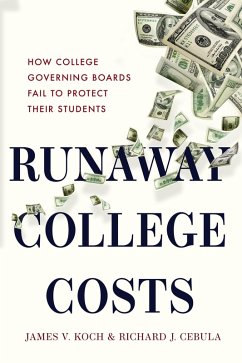What role have governing boards played in tuition and fee escalation at four-year public colleges and universities?In the United States, college costs, especially tuition and fees, have increased much more rapidly than either the overall Consumer Price Index or median household income. This cost inflation has effectively closed the doors of higher education to many qualified students and contributed to a staggering $1.5 trillion in student debt. Additionally, the number of college enrollments in the United States actually declined for eight straight years between 2011 and 2019, as college student bodies became increasingly stratified on the basis of family incomes. Virtually every public college cost increase, however, requires a positive vote from each university's governing board-and the record shows that these votes are nearly always unanimous. In Runaway College Costs, James V. Koch and Richard J. Cebula argue that many trustees have forgotten that they should act as fiduciaries who represent the best interests of students, parents, and taxpayers. Instead, Koch and Cebula explain, too often many trustees prize size and more prestigious rankings over access and affordability. These misplaced priorities make them vote in favor of ever more plush facilities, expensive intercollegiate athletic programs, administrative bloat, and outdated models of instruction and research. Koch and Cebula supply groundbreaking empirical evidence on the impact of governing board membership, size, and operations on tuition and fees. They show, for example, that the existence of a powerful statewide governing board exercises significant downward pressure on tuition and fees and that state funding cuts cannot explain more than one-half of the cost increases at the typical four-year public institution. The authors propose an action agenda for governing boards, including changing the incentives placed in front of campus presidents and senior administrators. Finally, they conclude that, although public university governing boards deserve blame for accelerating college cost inflation, they also are ideally situated to improve the situation. Runaway College Costs ends hopefully, suggesting that governing boards and their member trustees actually have the greatest potential to improve the situation. Providing the first rigorous empirical evidence of the impact that various modes of governance have had not only on tuition and fees but also on a half-dozen measures of institutional performance, this book will be of serious interest to governors, legislators, public university board members and their staffs, those interested in supporting the traditional goals of public higher education, and of course students and their parents, as well as taxpayers.
Dieser Download kann aus rechtlichen Gründen nur mit Rechnungsadresse in A, B, BG, CY, CZ, D, DK, EW, E, FIN, F, GR, HR, H, IRL, I, LT, L, LR, M, NL, PL, P, R, S, SLO, SK ausgeliefert werden.


